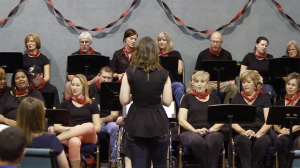TTUHSC School of Health Professions Hosts Aphasia Arts Camp
StAR Program summer camp works to rebuild language in stroke survivors
 The Texas Tech University Health Sciences Center (TTUHSC) School of Health Professions
Stroke/Aphasia Recovery (StAR) Program will host its annual Aphasia Arts Camp weekdays
June 6 through June 16. The camp will culminate with a concert and theater performance
on Thursday June 16 at 7 p.m. at Quaker Avenue Church of Christ, 1701 Quaker Ave.
The Texas Tech University Health Sciences Center (TTUHSC) School of Health Professions
Stroke/Aphasia Recovery (StAR) Program will host its annual Aphasia Arts Camp weekdays
June 6 through June 16. The camp will culminate with a concert and theater performance
on Thursday June 16 at 7 p.m. at Quaker Avenue Church of Christ, 1701 Quaker Ave.
Aphasia affects approximately 1 million individuals in the U.S., according to the American Speech-Language-Hearing Association, and strikes as the result of a stroke or other brain injury. The condition creates difficulty producing and understanding language and reading and writing. However, aphasia does not interfere with or diminish intelligence. Each year, the summer camp serves as a way for persons with aphasia to express themselves creatively, which is particularly meaningful to individuals who have lost the ability to speak.
“We purposely hold our aphasia arts camp during June, which is Aphasia Awareness Month,” said Melinda Corwin, Ph.D., professor and director of the StAR Program at the TTUHSC Department of Speech, Language and Hearing Sciences. “Studies have shown that creativity, when combined with other speech therapies, can be helpful in improving the condition of aphasia.”
Corwin said many people with aphasia are able to sing, even if they cannot talk. Singing involves the right hemisphere of the brain, which is typically not damaged with aphasia. Speaking involves the left hemisphere, which often is damaged with a stroke or brain injury, resulting in a loss of speech. This phenomenon makes the aphasia choir possible. However, despite the condition affecting more people than Parkinson’s disease, many have never heard of the condition or have incorrect beliefs about aphasia and its effects.
“The camp and performance display the talents of StAR Program participants and give them an opportunity to express themselves, while also raising awareness about aphasia,” Corwin said. “The event changes misconceptions and shows that a loss of language is not a loss of intelligence or creativity.”
For more information about the StAR Program or summer Aphasia Arts Camp, call (806) 743-9050.
Related Stories
Celebrating Veterans: TTUHSC’s General Martin Clay’s Legacy of Service and Leadership
From his initial enlistment in the Army National Guard 36 years ago to his leadership in military and civilian health care management roles, Major General Martin Clay’s career has been shaped by adaptability, mission focus and service to others.
Texas Tech University Health Sciences Center School of Nursing Named Best Accelerated Bachelor of Science in Nursing Program in Texas
The TTUHSC School of Nursing Accelerated Bachelor of Science in Nursing (BSN) program has been ranked the No. 1 accelerated nursing program in Texas by RegisteredNursing.org.
TTUHSC Names New Regional Dean for the School of Nursing
Louise Rice, DNP, RN, has been named regional dean of the TTUHSC School of Nursing on the Amarillo campus.
Recent Stories
The John Wayne Cancer Foundation Surgical Oncology Fellowship Program at Texas Tech University Health Sciences Center Announced
TTUHSC is collaborating with the John Wayne Cancer Foundation and has established the Big Cure Endowment, which supports the university’s efforts to reduce cancer incidence and increase survivability of people in rural and underserved areas.
TTUHSC Receives $1 Million Gift from Amarillo National Bank to Expand and Enhance Pediatric Care in the Panhandle
TTUHSC School of Medicine leaders accepted a $1 million philanthropic gift from Amarillo National Bank on Tuesday (Feb. 10), marking a transformational investment in pediatric care for the Texas Panhandle.
Texas Tech University Health Sciences Center Permian Basin Announces Pediatric Residency Program Gift
TTUHSC Permian Basin, along with the Permian Strategic Partnership and the Scharbauer Foundation, Feb. 5 announced a gift that will fund a new pediatric residency.
